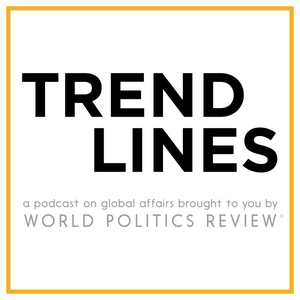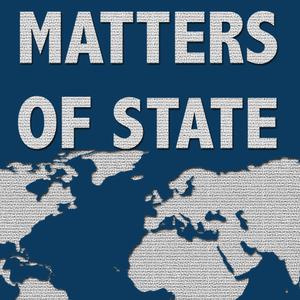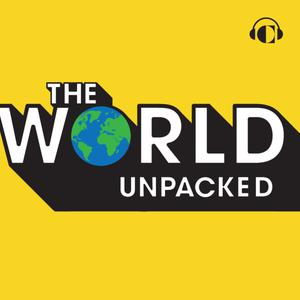
Trend Lines
World Politics Review
a podcast on global affairs brought to you World Politics Review
- 41 minutes 37 secondsThe War in Ukraine Is Changing How We Think of Drones and UAVs
The war in Ukraine has led to a fundamental shift in public perceptions of the military utility of drones. Until now, most people saw drones either as a more or less harmless toy with certain implications for privacy on one hand, and as a complex military system that roams the skies searching for terrorists on the other.
The proliferation of drones and the accompanying high-resolution videos of their exploits in Ukraine has blurred these borders. Modified commercial drones easily available in most electronics store across the world are dropping grenades on tanks and dismounted troops, while acting as accurate spotters for pinpoint artillery strikes. Their larger military counterparts are wreaking havoc on supply convoys and armored columns, and they allegedly even contributed to the sinking of the Russian missile cruiser Moskva, which sported one of the more capable air defense systems in Moscow’s Black Sea fleet.
That has made apparent what military planners and researchers have said for a while now: The military utility of unmanned aerial vehicles is still a work in progress, and the saturation of conflict zones with these systems will require changes in tactics and doctrine.
To dive into these issues and their ramifications for both military planners and policymakers, Trend Lines is joined by Ulrike Franke, a senior policy fellow at the European Council on Foreign Relations, where she specializes in military technology, including unmanned aerial vehicles and artificial intelligence.
Relevant articles on World Politics Review:
The Future of the Global Drone Market Will Not Be ‘Made in Europe’
Anti-Drone Advocacy Just Took a Major Leap Forward
The Campaign to Ban ‘Killer Robots’ Just Got a Boost
Behind the Growth Market in Counter-Drone Technology
Trend Lines is produced and edited by Peter Dörrie, a freelance journalist and analyst focusing on security and resource politics in Africa. You can follow him on Twitter at @peterdoerrie.
To send feedback or questions, email us at [email protected].
10 June 2022, 5:16 pm - 40 minutes 18 secondsTurkey’s Contentious Foreign Policy and Domestic Politics
Turkey is nominally a close military and political ally of the United States and other NATO countries, as well as an important economic partner to the European Union. But reading headlines in recent months and years, one wonders how close the Turkish government really feels to its western partners.
Under President Erdogan, Turkey has waged war against Kurdish allies of the United States in Syria and Iraq, and supported militias associated with al-Qaida, Hamas and other Islamic extremists. It has also developed a somewhat close relationship with Russia, even buying a Russian air defense system despite strident opposition from the United States—a decision which got it kicked out of the U.S.-led F-35 fighter jet program.
In the wake of the Russian invasion of Ukraine, Turkey has, largely succesfully, tried to maintain good relations with both sides and act as a mediator, delivering weapons to Ukraine and refraining from sanctions on Russia.
None of this can be understood without taking a close look at Turkey's domestic politics and especially its long-running economic crisis and the upcoming general elections in 2023 that could challenge President Erdogan's increasingly authoritarian grip on power.
Steven A. Cook, senior fellow for Middle East and Africa studies at the Council on Foreign Relations joins Trend Lines from Washington to discuss Turkish foreign policy and domestic politics, and the relationship between the two.
If you would like to request a full transcript of the episode, please send an email to [email protected].
Relevant articles on World Politics Review:
Erdogan Is Giving Turkey’s ‘Zero Problems’ Strategy Another Try
Sweden and Finland’s NATO Bids Hit a Roadblock Named Erdogan
Can Turkey’s Erdogan Rebuild the Bridges He Has Burned?
Erdogan’s Engagement Finds Willing Partners in Africa
Erdogan Has a Lot Riding on the Russia-Ukraine Crisis
Erdogan’s Obsession With Low Interest Rates Could Be His Downfall
Trend Lines is produced and edited by Peter Dörrie, a freelance journalist and analyst focusing on security and resource politics in Africa. You can follow him on Twitter at @peterdoerrie.
To send feedback or questions, email us at [email protected]
3 June 2022, 12:16 pm - 32 minutes 43 secondsThe New Space Race Has Already BegunThe first space race, between the United States and the Soviet Union, was a geopolitical and ideological struggle between superpowers. Now five decades in the past, it pushed the limits of technology to extremes and realized some long-held dreams of humanity, like putting a human on the moon. But after the enormous gains of the 1950s and 60s, space exploration advanced more gradually. More countries developed space programs, but between 1961 and 2000, only the Soviet Union, the United States and China put humans into space. After the U.S.’s Apollo program came to an end, humans never returned to the moon, and ambitious plans to expand human exploration to other planets were shelved. And with the end of NASA’s Space Shuttle program, the U.S. seemed to become disinterested in the final frontier, even contracting human launches out to Russia.
Over the past decade, something changed. In 2004, U.S. Congress required NASA and the Federal Aviation Administration to legalize private spaceflight. Then, in 2015, it passed the Spurring Private Aerospace Competitive and Entrepreneurship Act, better known as the SPACE Act, which expanded the rights to explore and exploit space to private citizens in the U.S.
During that same time, an internet entrepreneur named Elon Musk founded the aerospace company SpaceX with the goal of developing cheaper and more reliable access to space and, ultimately, to build a colony on Mars.
Today, SpaceX has developed and launched its partially reusable rocket, Falcon 9, more than 150 times. The company is on the cusp of introducing a fully reusable launch system, Starship, with a lift capacity of more than 100 tons to low-Earth Orbit. SpaceX and other private companies have also developed vehicles that can put humans into space, as well as “mega-constellations” of satellites that promise to provide high quality and affordable internet access independent of terrestrial infrastructure.
At the same time, Russia’s invasion of Ukraine has brought an end to decades of cooperation between Washington and Moscow in space, putting even the future of the International Space Station into question. Meanwhile, China is aggressively pushing its space program, as are India and other nations.
Arguably, the world is already in the age of a new Space Race. And this time, it is multipolar, with everyone from superpowers to startups participating.
Joining Trend Lines to discuss all this and more is Eric Berger, a senior space editor at Ars Technica and author of “Liftoff,” a book on the rise of SpaceX.
Relevant articles on World Politics Review:
As New Space Powers Emerge, NASA More Unreliable as Partner
Colonizing Space Is Not the Solution to Our Problems on Earth
Small States Can Play a Big Role in Space
The U.S. Space Program Is Back, but It Can’t Go It Alone
China’s Space Ambitions Have Washington on Edge
Trend Lines is produced and edited by Peter Dörrie, a freelance journalist and analyst focusing on security and resource politics in Africa. You can follow him on Twitter at @peterdoerrie.
To send feedback or questions, email us at [email protected]
21 April 2022, 1:00 pm - 42 minutes 5 secondsEveryone Has Come Out on the Losing End of Ethiopia’s Civil War
In 2019, Ethiopia’s young and dynamic prime minister, Abiy Ahmed, was awarded the Nobel Peace Prize for his efforts to resolve the longstanding tensions between his country and Eritrea. His announcement of domestic political reforms were received well both abroad and at home, many Ethiopians had felt excluded by a political system seen as having been captured by the country’s Tigrayan ethnic minority.
Today, none of this enthusiasm is left. In late 2020, long-running tensions between the central government and the Tigray People’s Liberation Front, once the dominant ethnic party in the ruling coalition, escalated into a full-blown civil war. The conflict has been characterized by shocking atrocities and abuses on all sides. More than 2 million people have been forced to flee their homes, and political repression has increased in the wake of the war.
On March 24, Abiy’s government and Tigrayan forces declared an indefinite humanitarian truce in Tigray, and some humanitarian aid has since reached the area. But the conflict, which has shattered Ethiopia’s image as an economic and political powerhouse in the region, is far from resolved.
On this week’s episode of Trend Lines, William Davison, the International Crisis Group’s senior analyst for Ethiopia, joins Peter Dörrie to unpack the background of the conflict and the latest developments in Ethiopia.
Relevant articles on World Politics Review:
How Abiy’s Effort to Redefine Ethiopia Led to War in Tigray
Tigray Is Being Deliberately Starved to Death
The U.S. Needs Sharper Tools to Stop the War in Ethiopia
Getting to a Sustainable Endgame in Ethiopia Will Be an Uphill Climb
Trend Lines is produced and edited by Peter Dörrie, a freelance journalist and analyst focusing on security and resource politics in Africa. You can follow him on Twitter at @peterdoerrie.
To send feedback or questions, email us at [email protected]
15 April 2022, 6:05 pm - 43 minutes 8 secondsMacron’s Reelection Bid Just Got More Complicated
French President Emmanuel Macron is comfortably ahead in the polls for the first round of France’s presidential election, which takes place Sunday. With far-right candidate Marine Le Pen likely to finish second, the second-round runoff is shaping up to be a repeat of 2017.
But while Macron won in a landslide in 2017 with more than 60 percent of the vote, this time the gap is much narrower, with less than 10 percent separating Macron and Le Pen in opinion polls and the momentum clearly in Le Pen’s favor.
Macron came into office on an ambitious and popular foreign policy agenda that portrayed the European Union not as a problem, but as a solution, particularly to the pressures the country faces as a result of globalization. But Macron has often struggled to communicate his vision to the French electorate, even as he suffers from his image of being detached from the population’s everyday problems, especially the spiraling cost of living.
On this week’s episode of Trend Lines, Célia Belin, a visiting fellow in the Brookings Institution’s Center on the United States and Europe, joins Peter Dörrie to discuss how foreign policy is intersecting with electoral politics in France’s presidential election, and what a possible second term for Macron—or a first term for Le Pen—might look like.
Relevant articles:
The Making of Macron’s Worldview
For Macron, Being Right on European Strategic Autonomy Isn’t Enough
France’s Security Law Debacle Shows the Dangers of Macron’s ‘Le Pen-Lite’ Agenda
Trend Lines is produced and edited by Peter Dörrie, a freelance journalist and analyst focusing on security and resource politics in Africa. You can follow him on Twitter at @peterdoerrie.
To send feedback or questions, email us at [email protected] .
7 April 2022, 7:55 pm - Latin America Needs More Than Elections to Solidify Democracy
Across Latin America, countries have come a long way in building democratic institutions. Most hold competitive and inclusive elections, for example. But the pervasive presence of organized crime and corruption has made progress in other areas, like the rule of law, difficult, leaving trust in the state almost nonexistent in many parts of Latin American.
Kevin Casas-Zamora, secretary-general of the International Institute for Democracy and Electoral Assistance, joins Peter Dörrie to discuss these issues, as well as the region’s reaction to the Russian invasion of Ukraine, given Moscow’s attempts over the past two decades to strengthen its ties to Latin America.
Relevant articles on WPR:
Venezuela’s Crisis Could Be Another Casualty of Russia’s Ukraine Invasion
War Returns to Colombia’s Countryside
Costa Rica’s Fragmented Politics Is Failing to Deliver Results
Castro Will Have Her Hands Full Cleaning Up Honduras’ Mafia State
Trend Lines is produced and edited by Peter Dörrie, a freelance journalist and analyst focusing on security and resource politics in Africa. You can follow him on Twitter at @peterdoerrie.
4 March 2022, 5:58 pm - 29 minutes 6 secondsThe International War on Waste
Plastics, e-waste and other hazardous waste are routinely traded across borders in what amounts to an “out of sight, out of mind” approach for the rich countries that produce them. The story is more complicated for the communities that receive and dispose of the waste.
Hazardous waste poses risks to the health of local communities and the environment, spurring attempts to ban its movement across borders. But in countries like Turkey, Vietnam and Ghana, waste is often processed to extract its residual value. The important source of income it provides explains why those efforts have been of limited success and questionable usefulness.
To discuss the risks but also the complexity of the international trade of hazardous wastes, Kate O’Neill joins Peter Dörrie on Trend Lines. O’Neill is a professor at the University of California Berkeley’s Department of Environmental Science, Policy and Management, where she specializes in researching waste, the circular economy and global environmental governance.
Relevant articles on WPR:
Cuts to Waste Imports in East Asia Put Pressure on World’s Producers
Toxic Waste Spill in Ivory Coast Exposes 'Dark Underbelly' of Globalization
E-Waste Is Taking Over the World. 5G Will Make It Even Worse
Can the World Win the War on Plastic?
Trend Lines is produced and edited by Peter Dörrie, a freelance journalist and analyst focusing on security and resource politics in Africa. You can follow him on Twitter at @peterdoerrie
25 February 2022, 5:51 pm - 22 minutes 19 secondsYoung People Deserve a Say in Tackling the Crises They'll InheritIn many countries, COVID-19 has robbed an entire generation of at least a year of education and child care, not to speak of many social connections. Climate change is already threatening the wellbeing of young people around the world and will negatively impact them and future generations for decades to come. And the impacts of many social problems like unemployment and the rising cost of housing are especially severe for younger people.
What would the world look like if policymakers gave priority in their decision-making to long-term consequences over short-term political expediency?
U.N. Next Generation Fellow and WPR columnist Aishwarya Machani joins Peter Dörrie on Trend Lines to discuss what the world looks like from the perspective of a young activist today and how to make young people’s voices heard in finding solutions to the crises that disproportionately affect them.
Relevant articles on WPR:
A Youth Activist Wish List to Make 2022 a Year of Breakthroughs
Young People Should Have a Say on COVID-19 Policy
Give Young Changemakers the Funding They Need
There Will Be No Pandemic Recovery Without Tackling Youth Unemployment
18 February 2022, 3:34 pm - 26 minutes 43 secondsGetting Nuclear Nonproliferation Back on TrackThe Nuclear Non-Proliferation Treaty’s 10th Review Conference has been postponed repeatedly due to the coronavirus pandemic, perhaps a symbol of the degree to which global efforts to curb the proliferation of nuclear weapons and reduce global stockpiles have stalled in recent years. North Korea continues to expand its nuclear capabilities, and the U.S., China and Russia are all investing heavily in modernizing their arsenals. And efforts to bring Iran back into compliance with the nonproliferation regime have been set back by the Trump administration’s withdrawal from the multilateral deal known as the JCPOA, or Joint Comprehensive Plan of Action, that contained Tehran’s nuclear program.
But while the NPT Review Conference is sorely needed to resolve these and a host of other outstanding problems regarding the treaty and its implementation, some observers welcomed the postponement, as it gives state parties more time to bridge some of their stark disagreements over the best way forward.
To discuss these issues and more, Miles Pomper, a senior fellow at the James Martin Center for Nonproliferation Studies at the Middlebury Institute of International Studies at Monterey, joins Peter Dörrie on Trend Lines.
Relevant articles on WPR:
NATO’s Nuclear Deterrent Gets a Reprieve—for Now
The U.S. Should Rethink Its Approach to Reviving the Iran Nuclear Deal
China’s Nuclear Build-Up Could Make for a More Dangerous Future
11 February 2022, 5:02 pm - 26 minutes 42 secondsChina’s Military Buildup Is Challenging U.S. Deterrence in AsiaMock amphibious assaults, regular intrusions into Taiwan’s air defense zone and the militarization of artificial islands in the South China Sea are just some of the headlines that China’s military buildup has generated in recent years. Under the leadership of President Xi Jinping, China has combined advances in electronic warfare with state-of-the-art military hardware like ballistic anti-ship missiles, stealth aircraft and aircraft carriers, with the ambitious goal of militarily dominating the South and East China Seas.
This strategy is squarely aimed at undermining the U.S. military’s preeminence in the region, which until now has served as a counterweight to China’s claims of sovereignty over large swathes of ocean in its immediate neighborhood, containing both valuable natural resources and some of the busiest shipping lanes in the world. And hovering over it all is the threat that China’s military ambitions pose to Taiwan.
Timothy Heath, senior defense researcher at the RAND corporation in Washington, joins Peter Dörrie on Trend Lines to discuss the implications and unintended consequences of China’s military modernization.
Relevant Articles on WPR:
The U.S.-China Rivalry According to China
The U.S. Faces Hard Choices on Strategic Ambiguity in Europe and Asia
The U.S. Should Compete With China and Russia—but Wisely
South Korea Has Quietly Taken Sides in the U.S.-China Rivalry
4 February 2022, 4:00 pm - 26 minutes 39 seconds2022 Is Shaping Up to Be a Year of Living Dangerously
Around the world in recent years, the enthusiastic embrace of globalization has given way to a backlash against liberalized trade. Since the start of the coronavirus pandemic, that shift toward a generalized closure, both between and within nations, has become almost a default setting, on display in everything from governments’ rush to close borders in response to new variants to hyperpartisan politics that turns policy debates into trench warfare.
Meanwhile, the pandemic, combined with climate change, has only created added urgency among younger generations to ensure that questions of intergenerational equity are made central to how we address both crises. And all of this is unfolding against the backdrop of an international order in which the taboo against interstate conflict is increasingly fraying.
If there is one reason for hope, it lies in humankind’s resilience and the tendency of all historical developments to set in motion countervailing forces that cause the pendulum once again to swing back in the opposite direction. WPR’s editor-in-chief Judah Grunstein joins Peter Dörrie to discuss the trends that will shape international politics in 2022.
Relevant Articles on WPR:
- Making Sense of a Year of Contradictions
- The West’s Border Closure Reflex Comes With a Cost
- A Youth Activist Wish List to Make 2022 a Year of Breakthroughs
- Putin Wants to Rewrite the End of the Cold War
- Globalization’s Perverse Convergence
Trend Lines is produced and edited by Peter Dörrie, a freelance journalist and analyst focusing on security and resource politics in Africa. You can follow him on Twitter at @peterdoerrie.
14 January 2022, 11:58 am - More Episodes? Get the App
Your feedback is valuable to us. Should you encounter any bugs, glitches, lack of functionality or other problems, please email us on [email protected] or join Moon.FM Telegram Group where you can talk directly to the dev team who are happy to answer any queries.
 The Institute of World Politics
The Institute of World Politics
 Matters of State - Underreported Issues in World News & International Relations
Matters of State - Underreported Issues in World News & International Relations
 The World Unpacked
The World Unpacked
 Carnegie Council Audio Podcast
Carnegie Council Audio Podcast
 Carnegie Endowment Events
Carnegie Endowment Events
 CSIS Events
CSIS Events